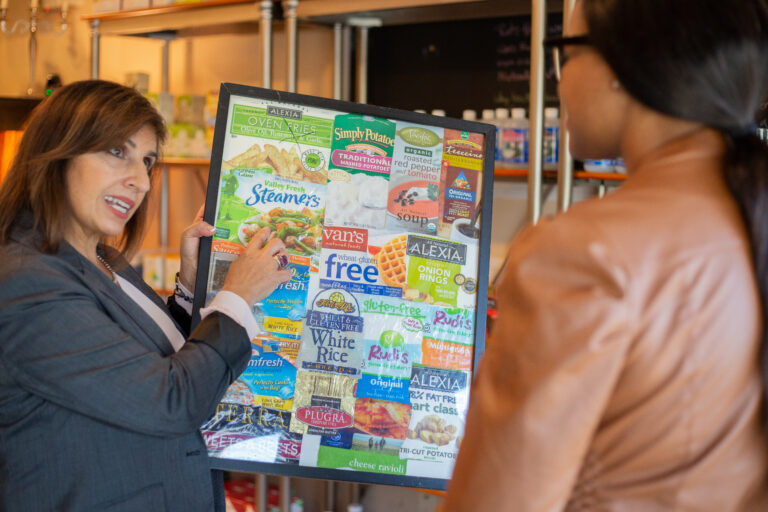Making and Keeping Your Intentions for 2020
by Melissa LaScaleia
Welcoming a New Year comes with many traditions, but none as prevalent as setting a New Year’s resolution.
But how common is it that what we begin with so much energy slowly dissipates after a few short weeks or months, and we fall back into old patterns?
Studies show it’s more common than not. Our brains are hardwired to repeat our current patterns— even if we want to change them. So to help you stay inspired and on track with your wellness goals this year, the Insider spoke with our area’s health and wellness expert, Emma Ware, to get some tips and tricks on how we can turn our visions for being our best selves into results-oriented actions.
Emma has been working in the health and fitness industry for over twenty-five years, and as such, is well positioned to offer some great advice. Her extensive credentials include a degree in health and fitness and a doctorate in holistic nutrition. She is a certified nutritionist as well as a clinical, certified homeopath.
In Los Angeles, Emma worked in partnership with medical doctors, surgeons, oncologists, and gastroenterologists to help people implement new exercise and lifestyle choices to stay in better health— often, resolving their medical conditions.
She also wrote a cookbook, Fast Wholesome Cooking, to teach people with digestive issues how to eat differently. The recipes, techniques, and approaches help people to manage their symptoms— like pain, bloating, and lethargy— with often the conditions dying away on their own as a result of adopting a cleaner diet.
Emma has helped hundreds of people in Myrtle Beach lose weight and reach their goals. She’s taught people how to shop, cook, get organized, change their lifestyle, have a better outlook on health, think differently, and accept the changes they need to make to get the outcomes that they want to achieve.
So we ask Emma— How do you set and stick to your resolutions?
“After I set an intention, I follow several steps to bring it to fruition,” she says. “Even though I’ve been working on myself for forty years, a protocol helps me to stay on track. When you follow a protocol, you’re holding yourself accountable and are more likely to succeed.
“First, I always practice having a good attitude when it comes to food and health. And just as important is having an understanding of what I should eat and what I shouldn’t. I know that I can’t eat everything I want to if I want the results that I want. So the first step is a good healthy dose of reality mixed with positivity.”
The second thing that Emma does is practice discipline. And what helps her maintain it is setting herself up for success with organization in all areas of her life.
“I always make sure I have foods that I can eat in my home as well as at my work. That way, if I suddenly become hungry, or need to work later hours, I know I have healthy options that support me, rather than having to resort to grabbing whatever I can find last minute. In this way, I stay in the driver’s seat about what I’m putting into my body and when. So planning and organization are key.”
“When you implement these qualities— like discipline, organization, and self-accountability— it empowers you because it gives you the feeling that you’re in control of your life and choices,” Emma adds. “As people, we’re always seeking paths of greater self-empowerment and confidence.”

With support systems in place, Emma moves on to creating a program for herself to follow based on her lifestyle choices.
“You’ll want to consider how many hours you plan to work, how many you plan to devote to leisure and other causes, and how many you’re willing to devote to cooking,” she says.
“I make a list of what I’m going to cook for the week in advance. I usually make about five or six items, and split them between my work and office. Whatever I don’t have time to cook, I buy. But whatever I buy has to be clean and the closest thing you can get to home cooking.
“What’s important for me is knowing that I’m not going to deprive myself, and that I’m going to eat foods that store calories longer in my system so I’ll be sustained longer. Making food choices like that will also help me curb my appetite so I’m not overeating.”
Part of why this program works so well for Emma is because around holidays, birthdays, and vacations she gives herself permission to enjoy herself as she chooses— approaching her eating habits with a work hard play hard mentality.
“Reconciling to change is easy if you have a different way of looking at things,” she says. “The first thing you have to do is accept that you need to make changes. The second is to implement a program that you can understand, accept, and have patience with as you follow it.
“People also need to recognize that changes take time and don’t happen overnight. If you’ve had a bad habit for twenty years of your life, you need to be patient with changing it. If you fall off a program, then start all over again. You can’t be hard on yourself.”
And to implement those changes, Emma advocates the importance of cheating.
“While you’re eating the best that you can, if you suddenly have a craving for donuts or coffee, then eat one donut instead of three, and drink half a cup of coffee instead of a full one. Then you feel amazing because you cut back by half and still satisfied a craving. You need to let go of the idea of perfection and adopt a mentality of balance instead. Perfection isn’t realistic, but balance is natural.”
Cheating goes hand-in-hand with another aspect of Emma’s philosophy— don’t go cold turkey with anything. Instead, start gradually. Find good foods to replace the bad ones. But the most important principle to remember, according to Emma, is to eat heartily and well, so that when you do have moments of craving candy or soda, you don’t go crazy.
“After some time, you’ll get to the point where you don’t want to eat those foods anymore anyway,” says Emma. “Your body changes on its own and then your habits change.”
The biggest obstacle to success that Emma sees is that people give up too easily.
“Because people tend to live in the fast lane, they adopt this mentality of everything needs to change now,” she says. “So they think, ‘this isn’t working,’ and they want to give up. Another challenge I see is that people have a hard time putting the effort into it. You have to work at it. But once you start, it becomes second nature.”
Other common pitfalls are yo-yo dieting and deprivation.

“Yo-yo dieting is detrimental to the human body,” Emma says. “It stops you from reaching your goals because you’re giving your body different signals all the time: back and forth.”
Today, with so many lifestyle programs promising the holy grail of health— from keto to veganism to the blood type diet— it can be overwhelming to know which to follow.
“Remember that these programs are not meant for every person— it really depends on where the individual is at in their life with their health,” Emma says.
“With any extreme program, it can feel great at the beginning while you’re detoxing, but at some point, your own body will say no more. Anytime you do something where you eliminate balance long-term, you become malnourished, because your body is lacking some vitamin or mineral found in a food that you’ve stopped consuming, and then you don’t feel well anymore. I’ve seen this with many programs.
“The best way to eat is is to adopt principles of balance and moderation. If you are looking for a quick fix, then do a diet. If you want something permanent, then balance and moderation.”
Today, Emma has an office and storefront in Market Common called Emma’s School of Healthy Eating, where she conducts consultations, private cooking classes, and private presentations. At her store, she sells products like herbs, supplements, teas, and vitamins.
She helps people with a variety of health concerns including digestive and adrenal issues, weight loss, high cholesterol, and low energy; and receives a lot of referrals from doctors.
This year, as you’re setting New Year’s resolutions for yourself— here are some additional things to keep in mind:
- Plants contain mineral proteins; animal proteins are found in fish and land animals. We need both to carry out our body’s metabolic functions.
- Make sure that you’re eliminating well. Drink more water, eat more vegetables and fruits, and stay away from boxed and packaged foods, which are constipating. Healthy elimination is the key to vitality.
- Implement dry body brushing to open your lymphatic system and make sure everything is flowing smoothly; your lymph is directly linked to your immune system.
“If you fall off your program, start all over again, and don’t give up,” Emma says. “You can still be better at the end of the year than when you started.”
Emma’s School of Healthy Eating

















